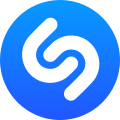2002–2006: Early days
Initially, in 2002, the service was launched only in the UK and was known as "2580", as the number was the short code that customers dialled from their mobile phone to get music recognized. [3] The phone would automatically hang up after 30 seconds. A result was then sent to the user in the form of a text message containing the song title and artist name. At a later date, the service also began to add hyperlinks in the text message to allow the user to download the song online. [14]
Shazam launched in the US on the AT&T Wireless network in 2004 in a joint offering with Musicphone, a now defunct San Francisco-based company. The service was free at launch with AT&T saying that it would charge $0.99 for each use in the future. [15]
In 2006, users were charged £0.60 per call or had unlimited use for £4.50 a month, as well as an online service to keep track of all tags. [14]
2006–2017: Smartphone app and expansion
Shazam first became available as an app in 2006 exclusively on the Amp'd Mobile cellular service.
Shazam for iPhone debuted on 10 July 2008, with the launch of Apple's App Store. The free app enabled users to launch iTunes and buy the song directly, [16] although the service struggled to identify classical music. [17]
Shazam launched on the Android platform on 30 October 2008, [18] and on the Windows Mobile Marketplace a year later. [19] Encore first appeared for the iPhone in November 2009. [20]
In December 2009, Shazam was downloaded ten million times in 150 countries across 350 mobile operators. Around eight percent of users purchased a track after it was identified by the service. [3] Its success led to a funding round from Kleiner Perkins Caufield & Byers in October 2009. [3] [21] In January 2011, Apple announced that Shazam was the fourth most downloaded free app of all time on the App Store, while rival SoundHound had the top paid iPad app. [22]
In August 2012, Shazam announced the service had been used to tag five billion songs, TV shows and advertisements. In addition, Shazam claimed to have over 225 million users across 200 countries. [23] A month later, the service claimed to have more than 250 million users with two million active users per week. [9] In 2014, the app announced it had 100 million monthly active users and over 500 million downloads. [24] In October 2014, Shazam announced its technology had been used to identify 15 billion songs. [25]
The Shazam app was listed among Techland's 50 Best Android Applications for 2013. [26]
In August 2014, Shazam announced there would be no more updates for Shazam(RED) after 7 August. [27]
Apple's launch of iOS 8 in September 2014 came with the integration of Shazam into Apple's virtual assistant Siri. [28]
In February 2013, Shazam announced a partnership with the music store Beatport, adding its library of electronic music to the service. [29] On 3 April 2013 Shazam announced an exclusive partnership with Saavn, an Indian online music streaming service. The deal added nearly 1 million songs in Indian languages to Shazam's database. [30] [31] [32] [33] In July 2014, Shazam announced a partnership with Rdio that allows Shazam users to stream full songs within the app. [34]
In May 2015, Shazam was launched on Wear OS (formerly Android Wear). [35]
Rich Riley [36] joined Shazam as CEO in April 2013. [37] after over 13 years at Yahoo! [38] Riley replaced Andrew Fisher, who was hired from Infospace into the CEO role in 2005 to strengthen industry partnerships and grow the userbase. [3] Fisher is now executive chairman.
In addition to music, Shazam has announced collaborations with partners across television, advertising and cinema. In May 2014, National CineMedia announced a partnership with Shazam to incorporate Shazam into FirstLook pre-show segments that run in Regal, AMC and Cinemark cinemas. [39] In November 2014, NCM and Shazam announced that NCM FirstLook pre-shows are now Shazam enabled on over 20,000 movie screens across the United States. [40]
In August 2014, Shazam announced the launch of Resonate, a sales product that allows TV networks to access its technology and user base. The news included the announcement of partnerships with AMC, A&E, Dick Clark Productions and Fuse. [2]
Shazam announced a 2015 partnership with Sun Broadcast Group on Shazam for Radio, a new offering that will allow radio stations to push customised content to listeners on Sun Broadcast's over 8,000 radio stations in the US. [41]
In December 2016, Shazam announced a partnership with social media application Snapchat. [42] The new feature comes as part of the latest Snapchat update and integration with Shazam, which allows Snapchat users to use Shazam's Music information retrieval technology by pressing and holding the camera screen. [43]
Shazam first made a profit in 2016, 16 years after its founding and 14 years after its product launch. [12]



